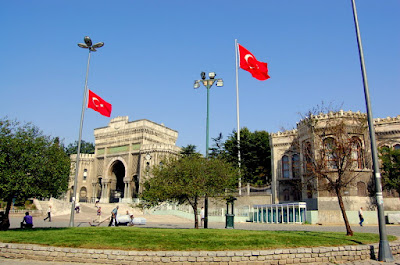 from their website:
from their website:![]()
Istanbul University, as one of the oldest educational institutions, not only of Turkey, but also of the world, was founded when Mehmet the Conqueror conquered Istanbul. Education began to be available in theological schools ("medrese/madrasah" as they were then called) and, until the end of the 16th century, these schools were instrumental in educating the ruling cadres of the Ottoman society. However, when the "madrasahs" were no longer able to meet the needs of the modern world, a restructuring process began, and as a result, the institutions of higher education called "Darülfünun," the core of Istanbul University, were established. Through the educational reforms, introduced by the founder of the Turkish Republic, Mustafa Kemal Ataturk , the " madrasahs" were abolished in 1924. As a first step in modernization, the Istanbul Darülfünun was established, comprising the departments of medicine, law, literature, theology, and science. The institution was renamed �Istanbul University� in accordance with Ataturk's University Reform, and higher education was restructured in Turkey to meet the demands of contemporary society. During these early years, Istanbul University welcomed foreign academics who fled Germany as teaching staff.
When the Turkish Republic was founded, Istanbul University was the only institution of higher education. That is the reason why it is the provider of teaching staff for all the universities in Turkey today. Many academics educated here have initiated the establishment of the other higher education institutions. Thus, Istanbul University has always been instrumental in the training and strengthening of our country's scientific cadres.
In addition to its scientific impact, Istanbul University has also been a leader in the movement towards enlightenment and modernization that began with the Republic by acting as a bridge between science and life. It is aware of its role in the perpetuation of Atatürk's principles and reforms. Istanbul University will protect in line with this in all issues pertaining to public life with no concessions from its decisive stand.
Istanbul University functions as a reflection of Turkey's history of science and independence.
As was the case in its history, Istanbul University is still in the vanguard of scientific success. Our alumni figure in all strata of society and serve their country through the important positions they hold.
![]()
Istanbul University consists of 17 faculties, 5 departments, 13 schools, 15 institutes and 26 centers situated in many districts of Istanbul. In the firts years of its existence, the university was based in Beyazıt the historic area in the environs, but with the passage of time, it expanded to locations in many regions of Istanbul. Today, the Rectorate, the administrative units attached to the Rectorate, and a number of faculties and colleges are situated in Beyazıt, Lalaeli, Saraçhane and Vezneciler.



No comments:
Post a Comment